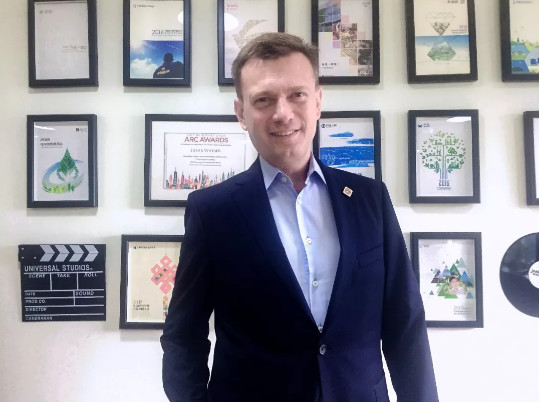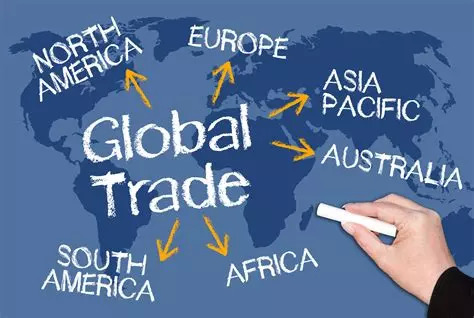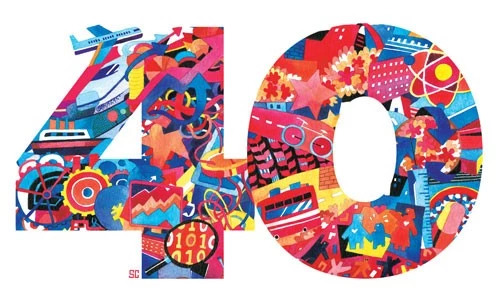Trade war, a bump in the road of global sustainable trade (I)
2018-09-12China WTO Tribuneadmin0010

Interviewee|Mr. Christian Ewert, Director General of amfori
Facing the turbulent global trade situation, Mr.Christian Ewert, Director General of amfori (formerly known as Foreign Trade Association) is optimistic.
“It (the trade conflict) is a bump in the road. If the world support sustainable development, I’m optimistic.”Mr.Christian Ewert said in the interview, free trade has been the global consensus and the mission of amfori is to promote the parallel trade, free and global trade in a sustainable fashion.
Trade conflict won’t become the norm
China WTO Tribune: The US unilateralism imposes global trade environment uncertainty. To what extent do you think it will affect the sustainability of enterprises and trade? Especially some small and medium enterprises?
Mr. Ewert: US has continuously imposed tariffs. This will affect a very wide range of fast moving consumer goods from textiles and clothing, furniture, electronics, to luggage and hand bags and anything that especially the American consumers enjoy at very competitive prices. Since a lot of these consumer products are manufactured by many small manufacturers, it would have a significantly negative impact on them.
If it comes to such a situation, the small businesses have to look forward. And I believe the important element here is, we have to see how we can build a more sustainable future and one of the important tasks that we have to fulfill is to step up our efforts in advocacy primarily at the global trade level, to have a positive impact on bilateral trade relations. What is particularly important, is that we reach out two national governments so that we can ensure that the WTO is actually empowered and has the ability to really do its job when it comes to global international trade.

China WTO Tribune: Do you think trade wars will become the norm?
Mr. Ewert: I’m actually firmly convinced it will not. My clear conviction is, whenever there was a trade conflict in the past, there is no winner.
What Mr. Trump belives is all about “you lose, I win”. It's not gonna happen in this case. I’m also, seeing the first kind of indications that, he is also starting to understand there is not gonna be a winner in such a conflict. I firmly see China as a trading partner to the United States. So the approach that he has taken, I regard very questionable.
China WTO Tribune: Will social responsibility factors such as the environment, human rights, and intellectual property rights become more and more important and impact international trade increasingly?
Mr. Ewert: Let’s say the topics that you just mentioned, are gaining momentum in the international stage. We have to realize the Sustainable Development Goals (SDGs) and reach the goals of the Paris Climate Agreement. There is globally more and more attention being paid to all these issues, whether it's environmental sustainability or efforts on the social side. Also, the intellectual property protection is among the issues that global economies cannot ignore, otherwise you, as a country, will not be competitive.
So, maybe the current situation in the worst case is a bump in the road. But I think generally all the indications have in the direction that, these values are clearly in the process of being established. And they're not just thrown overboard because of a trade conflict. Look at a brief example, the Millennium Development Goals (MDGs). It went all the way through the biggest financial crisis for a long time, 2008 and 2009. Yes, there was a bump in the road. But at the end of the day, significant accomplishments, and almost all the goals were really met, or even in certain instances were exceeded. So, if the global community stands together behind this, I’m optimistic.
China WTO Tribune: In the previous interview in 2016, you described the enterprise in globalization as “we are all siting in boat, so whoever rowing the slowest will affect everyone”. To achieve sustainable development, everyone must row together. Facing the trend of anti-globalization, will you still be convinced of this belief?
Mr. Ewert: Yes, amfori and China WTO Tribune share the same belief——support the open and sustainable trade and oppose trade protectionism. Now, the sustainable trade is in the right direction.
I think maybe the small change that has taken place as we are still all rowing, but one gentleman, Mr. Trump, is rowing in the opposite direction.

Now, let's take a slightly bigger example. Look at our planet, our planet is under threat. Look at the weather patterns here. It's not China that just had record temperatures and breaks all records ever recorded. So is the northern Europe. I think for me, these are all simple signs that not any single country will be able to reduce the risk of our planet alone. This is only a joint effort that will yield, some sort of a positive outcome. So again, it's a bump in the road with Mr.Trump. I'm convinced that a future US administration will rejoin the Paris Climate Agreement, because whether he believes it or not, we all live under one and same planet.
China's Reform and Opening Up is vital to global trade
China WTO Tribune: For the new trading conditions, what actions do you think China should take to cope with the challenges?
Mr. Ewert: Dialogue. In a certain way, I can understand President Trump is the first one who clearly recognizes that there is a significant trade imbalance, but you only do this through dialogue and not with a gun to your head.
I feel very encouraged that Chinese President Xi Jinping, truly a visionary politician, said, “We open China more to the rest of the world”. This is the mechanism in order to, on one side address the issue of a trade imbalance, and on the other side also to give a wider choice to the Chinese population.
When it comes to the intellectual property protection, with all the positive recognition of China, I think China still also has to do a bit of his own homework in the context to remove some of the still existing barriers. The barriers will especially impact the retail business in China.
China WTO Tribune: 2018 marks the 40th anniversary of China's Reform and Opening Up. How do you see it?
Mr. Ewert: I start with a little personal observation. I had the opportunity thirteen years after the reform, to visit China and Beijing in particular. I have to say I was impressed then but I’m even more impressed when I come back. Now what China has basically gone through in forty years, in my own experience over 25 years, is just simply remarkable. Well, it will take us solid hundred plus years to really develop to the level where China is today.

China WTO Tribune: According to your observations and feelings, what changes has the reform and opening up brought to China and the world?
Mr. Ewert: Maybe the most significant in this context is, 800 million Chinese were really pulled out of poverty. This was brought by the employment opportunities created and also met one key objective of MDGs and SDGs. Right now China is the second largest economy. I think we can count the number of years on one hand. By the time that China will be the number one in global economy. That also clearly means that China will have more impact or will play a more significant role when it comes to SDGs.
The discussions I’ve had with various government organizations just during this visit here, I feel very encouraged. I can clearly see this is not just a topic. This is very seriously taken by the government. Even when I go on the road, you see a reference to SDGs on the bus stops. There is an attempt to also provide some sort of information to the general public. As a leading business association driving open and sustainable trade, we clearly believe that the deepening of the reform process that China has embarked upon, will be a key facilitate or for the global trade.
China WTO Tribune: From the perspective of international trade development, what are your expectations for deepening reform and opening up in China concerning the Sino-European cooperation?
Mr. Ewert: Expectation is that we continue the positive dialogue that we have between the EU and China. I think we had a positive summit just two weeks ago here, this time in Beijing after three years. For the first time, a joint communiques and statement was signed in the greater problem. I think these are for me positive signals and we will see to which extent we can support and promote this positive development. When I look at the Belt and Road Initiative, there are many opportunities where we can make progress.
(Mr. Christian Ewert was interviewed on August 2, 2018, please see the 2nd part of this interview in our next WeChat push)
Best Practices
- Beijing Public Transportation Corporation: Developing green transportation to build a harmonious and livable capital
- CGN: Building a modern factory in barren deserts and developing a new win-win cooperation model along “Belt and Road”
- Guangzhou Huasheng Enterprise Management Service Co., Ltd.: Transparent services for reshaping the automobile service market
Upcoming Event

All the materials on the site “Source: XXX (not from this site)” have been reprinted from other media. They do not imply the agreement by the site.
All the materials with “Source: CSR-China Website” are the copyright of CSR-China Website. None of them may be used in any form or by any means without permission from CSR-China Website.
GoldenBee Official WeChat
Copyright © Csr-china.net All Right Reserved.
京ICP备13041808号-3












